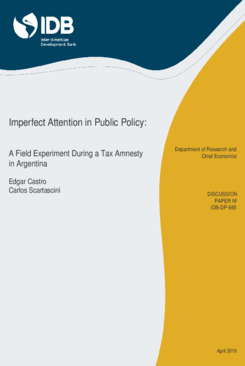Imperfect Attention in Public Policy: A Field Experiment during a Tax Amnesty in Argentina
Date
Apr 2019
Summary
Limited attention affects our ability to make good choices, but governments can improve decision-making by providing simpler and more salient information. We evaluate the role of inattention in decision-making in the context of a field experiment implemented during a tax amnesty in the city of Santa Fe (Argentina). Tax amnesties are advertised to delinquent taxpayers through direct communication. In the intervention, we redesign the communication notices sent to the taxpayers to evaluate whether increasing salience and reducing cognitive costs increase the probability that taxpayers put attention to the message and understand better the benefits of tax amnesty. We randomize more than 54,000 taxpayers. A group of taxpayers receives the traditional messages. The treatment groups receive redesigned communications. Our results show that messages that reduce the cognitive costs increase the probability that taxpayers will enter the tax amnesty. The amount collected in the treatment groups is up to 8 percent higher than in the control group. We also exploit the exogenous variation in attention to evaluate the convenience of the tax amnesty program for the city given that some people may stop paying the regular bills (creates moral hazard). We find that while people are more willing to cancel their past debt, they are also more likely to reduce their compliance with the current tax bills. Moreover, there is a negative spillover effect in the compliant population (those who had no debts). When the tax amnesty becomes more noticeable, their incentive to comply falls substantially. Making public policy more salient, easier to understand, and less cognitive intensive facilitates decision-making. However, doing it during a tax amnesty may increase collection of past debt, but it could also generate negative incentives for tax compliance in the overall population.




